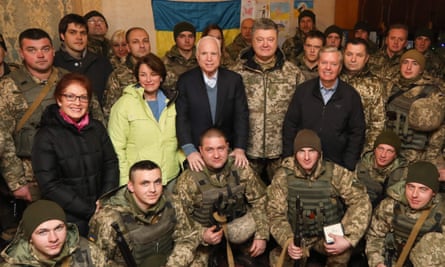
Sen. John McCain urges Ukraine to “stand up to Putin.”
New Yorker Article on post-Soviet Russia Ignores
US Involvement in 2014 Coup
Washington Liberals
(June 20, 2023) — In The New Yorker’s “How Russia went from Ally to Adversary,” (published in the June 19, 2023 print edition as “Eastern Promises”), author Keith Gessen tells some of the history of post-Soviet Russia.
Unusual for mainstream journalism, the article indicates that US policy contributed to the rise of Putin and other authoritarian leaders in Russia and former Soviet bloc nations — via brutal economic policies the US imposed on them.
Gessen writes that while some people in the Bush (1) and Clinton administrations wanted to lend Russia a helping hand — arguing that such aid would be more likely to lead to a democratic Russia — the consensus was to treat Russia as a defeated adversary.
Gessen writes:
By the logic of co-transformation, we urged brutal free-market policies on Eastern Europe, and then imposed them on ourselves. Having participated in the creation of the Russian monster, we are now forced to become monsters to battle it, to manufacture and sell more weapons, to cheer the death of Russian soldiers, to spend more and more on defense, both here and in Europe, and to create the atmosphere and conditions of a second Cold War, because we failed to figure out how to secure the peace after the last one.
The article points out that Gorbachev had expressed to Secretary of State James Baker a desire for Russia to be integrated as an equal partner in a new pan-European security arrangement. But Baker responded, “It is an excellent dream but only a dream.”
So, the article goes half way towards describing partial US responsibility for provoking the war in Ukraine but takes pains to say things like: “The development of Russia in the post-Cold War period was not the result of a Western plot or Western actions. Russian officials chose, within a narrow range of options, how to behave, and they could have chosen differently. The Russian invasion of Ukraine, in February 2022, was no more inevitable or foreordained than the US invasion of Iraq, in 2003. Still, it’s worth asking what other course we might have followed.”
Moreover, in his discussion of the 2014 Maidan Revolution (aka as the Revolution of Dignity), Gessen doesn’t tell the whole story. He writes:
In the winter of 2004-05, Putin watched helplessly as thousands of protesters in Kyiv demanded and won a new vote after large-scale fraud had seemed to give Viktor Yanukovych the Presidential victory in Ukraine.
Yanukovych managed to mount a successful Presidential bid in the next election cycle, but in 2014 vast protests over his refusal to sign an association agreement with the E.U. once again chased him from power. That same week, Russian soldiers in unmarked uniforms appeared in Crimea. The invasion of Ukraine had begun.
That summary leaves out the great role that the US played in aiding the 2014 revolution, which can also be called a coup.
In the New York Times’ The War in Ukraine May Be Impossible to Stop. And the US Deserves Much of the Blame, Christopher Caldwell writes “In 2014 the United States backed an uprising — in its final stages a violent uprising — against the legitimately elected Ukrainian government of Viktor Yanukovych, which was pro-Russian.”
US Senator Chris Murphy said in an interview in 2014: “With respect to Ukraine, we have not sat on the sidelines. We have been very much involved. Members of the Senate have been there, members of the State Department who have been on the square …. I really think that the clear position of the United States has been in part what has helped lead to this change in regime…. I think it was our role, including sanctions and threats of sanctions, that forced, in part, Yanukovich from office.”
Then there is the infamous recording of a phone call between Victoria Nuland and US ambassador to Ukraine Geoffey Pyatt, in which they discuss who should be next leader of Ukraine.
And what about US involvement in various color revolutions in Eastern Europe, via funding from the National Endowment for Democracy (a regime change auxiliary to the CIA) and NED’s documented aid for Ukrainian opposition groups.
The Gessen piece also ignores the well-documented presence of far right, anti-Russia political and military groups in Ukraine — something even the US Congress tried to deal with. See here for a list of scores of articles in mainstream media documenting their presence.
And while the article points to statements by James Baker that Gorbachev interpreted as a promise not to expand NATO eastward, the article doesn’t tell the story of additional promises made to Russian leaders. See Truthout’s Claims Over Broken Promises About NATO Simmer at the Heart of the Ukraine Crisis.
See How the US provoked Russia in Ukraine: A Compendium for copious quotations and links to articles about US provocations in Ukraine.

New Yorker Article on the Immigration Crisis
Ignores US Responsibility for Provoking It
Washington Liberals
(June 19, 2023) — The New Yorker article Biden’s Dilemma at the Border (June 19, 2023), by Dexter Filkins, describes the havoc and suffering caused by the large number of migrants fleeing South America towards the United States.
The article says “Some of the biggest groups [of immigrants] were coming from four countries — Venezuela, Cuba, Nicaragua, and Haiti — with which the US maintained troubled relations.” But other than that hint of US responsibility for the crisis, the article fails to tell how US foreign and economic policies contribute to the turmoil and poverty in South America. Instead, the article explains migration this way:
Much of the migration to the United States in recent years has been driven by profound developments in Central and South America and in the Caribbean, where economic turmoil, natural disasters, and drug-related violence have brought many states to the brink of collapse, and where gangs and drug cartels often operate beyond state control.
It’s not just the US that is besieged by migrants but also countries throughout the region, Biden officials pointed out; unrest in Venezuela has produced at least seven million refugees, most of whom have fled to Colombia and other countries nearby.
The article should have mentioned that the United States imposes economic sanctions on three of the four countries that the article calls “most problematic” with regard to migration: Cuba, Venezuela, and Nicaragua. And the US attempted regime change operations against all four countries.
Indeed, according to World Population Review, Wikipedia, The Progressive, and The Nation, the United States attempted regime change operations in the following countries in Latin America: Haiti (1915-1934), Guatemala (1953), Dominican Republic (1961), Cuba (1961), Brazil (1964), Argentina (1964), Columbia (1964, 1999, 2021), Bolivia (1971. 2019), Chile (1973), Nicaragua (1985, Iran Contras), Panama (1989), and Venezuela (2002 — now). And there is evidence that the US helped elect Boslonaro in Brazil.
The US has a history of overthrowing democratically elected governments in Latin American and supporting oppressive regimes friendly to US business or ideological interests.
And these are just the coups and interventions that have been made public. Much of US foreign policy is executed covertly, with harsh penalties on anyone who exposes the secrets.
Just as NATO expansion helped lead to the war in Ukraine, US foreign policy in Latin America helped cause the migration crisis affecting the US, and the mainstream media hides the facts in both cases.
See Also:
Time Magazine: Why the Threat of US Intervention in Venezuela Revives Historical Tensions in the Region
The Nation: The US Must End Its Economic War Against Venezuela
The Nation: House Democrats Want to Know the Truth About the Bolivian Coup
The Progressive Magazine: The United States’ Role in Colombia’s Forever War
US Department of Treasury: Sanctions Programs and Country Information
WA Liberals: Evidence that US Meddling in Brazil Helped Elect Bolsonaro
Posted in accordance with Title 17, Section 107, US Code, for noncommercial, educational purposes.